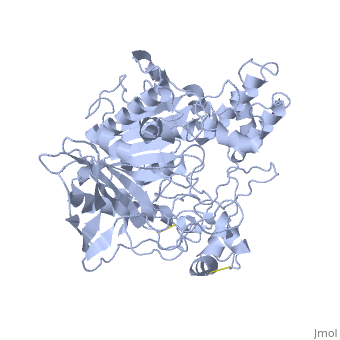1akn
From Proteopedia
(New page: 200px<br /><applet load="1akn" size="450" color="white" frame="true" align="right" spinBox="true" caption="1akn, resolution 2.8Å" /> '''STRUCTURE OF BILE-SAL...) |
|||
| Line 1: | Line 1: | ||
| - | [[Image:1akn.gif|left|200px]]<br /><applet load="1akn" size=" | + | [[Image:1akn.gif|left|200px]]<br /><applet load="1akn" size="350" color="white" frame="true" align="right" spinBox="true" |
caption="1akn, resolution 2.8Å" /> | caption="1akn, resolution 2.8Å" /> | ||
'''STRUCTURE OF BILE-SALT ACTIVATED LIPASE'''<br /> | '''STRUCTURE OF BILE-SALT ACTIVATED LIPASE'''<br /> | ||
==Overview== | ==Overview== | ||
| - | BACKGROUND: The intestinally located pancreatic enzyme, bile salt | + | BACKGROUND: The intestinally located pancreatic enzyme, bile salt activated lipase (BAL), possesses unique activities for digesting different kinds of lipids. It also differs from other lipases in a requirement of bile salts for activity. A structure-based explanation for these unique properties has not been reached so far due to the absence of a three-dimensional structure. RESULTS: The crystal structures of bovine BAL and its complex with taurocholate have been determined at 2.8 A resolution. The overall structure of BAL belongs to the alpha/beta hydrolase fold family. Two bile salt binding sites were found in each BAL molecule within the BAL-taurocholate complex structure. One of these sites is located close to a hairpin loop near the active site. Upon the binding of taurocholate, this loop becomes less mobile and assumes a different conformation. The other bile salt binding site is located remote from the active site. In both structures, BAL forms similar dimers with the active sites facing each other. CONCLUSIONS: Bile salts activate BAL by binding to a relatively short ten-residue loop near the active site, and stabilize the loop in an open conformation. Presumably, this conformational change leads to the formation of the substrate-binding site, as suggested from kinetic data. The BAL dimer observed in the crystal structure may also play a functional role under physiological conditions. |
==About this Structure== | ==About this Structure== | ||
| - | 1AKN is a [http://en.wikipedia.org/wiki/Single_protein Single protein] structure of sequence from [http://en.wikipedia.org/wiki/Bos_taurus Bos taurus] with NAG as [http://en.wikipedia.org/wiki/ligand ligand]. Active as [http://en.wikipedia.org/wiki/Triacylglycerol_lipase Triacylglycerol lipase], with EC number [http://www.brenda-enzymes.info/php/result_flat.php4?ecno=3.1.1.3 3.1.1.3] Full crystallographic information is available from [http:// | + | 1AKN is a [http://en.wikipedia.org/wiki/Single_protein Single protein] structure of sequence from [http://en.wikipedia.org/wiki/Bos_taurus Bos taurus] with <scene name='pdbligand=NAG:'>NAG</scene> as [http://en.wikipedia.org/wiki/ligand ligand]. Active as [http://en.wikipedia.org/wiki/Triacylglycerol_lipase Triacylglycerol lipase], with EC number [http://www.brenda-enzymes.info/php/result_flat.php4?ecno=3.1.1.3 3.1.1.3] Full crystallographic information is available from [http://oca.weizmann.ac.il/oca-bin/ocashort?id=1AKN OCA]. |
==Reference== | ==Reference== | ||
| Line 24: | Line 24: | ||
[[Category: signal]] | [[Category: signal]] | ||
| - | ''Page seeded by [http:// | + | ''Page seeded by [http://oca.weizmann.ac.il/oca OCA ] on Thu Feb 21 11:45:34 2008'' |
Revision as of 09:45, 21 February 2008
|
STRUCTURE OF BILE-SALT ACTIVATED LIPASE
Overview
BACKGROUND: The intestinally located pancreatic enzyme, bile salt activated lipase (BAL), possesses unique activities for digesting different kinds of lipids. It also differs from other lipases in a requirement of bile salts for activity. A structure-based explanation for these unique properties has not been reached so far due to the absence of a three-dimensional structure. RESULTS: The crystal structures of bovine BAL and its complex with taurocholate have been determined at 2.8 A resolution. The overall structure of BAL belongs to the alpha/beta hydrolase fold family. Two bile salt binding sites were found in each BAL molecule within the BAL-taurocholate complex structure. One of these sites is located close to a hairpin loop near the active site. Upon the binding of taurocholate, this loop becomes less mobile and assumes a different conformation. The other bile salt binding site is located remote from the active site. In both structures, BAL forms similar dimers with the active sites facing each other. CONCLUSIONS: Bile salts activate BAL by binding to a relatively short ten-residue loop near the active site, and stabilize the loop in an open conformation. Presumably, this conformational change leads to the formation of the substrate-binding site, as suggested from kinetic data. The BAL dimer observed in the crystal structure may also play a functional role under physiological conditions.
About this Structure
1AKN is a Single protein structure of sequence from Bos taurus with as ligand. Active as Triacylglycerol lipase, with EC number 3.1.1.3 Full crystallographic information is available from OCA.
Reference
The crystal structure of bovine bile salt activated lipase: insights into the bile salt activation mechanism., Wang X, Wang CS, Tang J, Dyda F, Zhang XC, Structure. 1997 Sep 15;5(9):1209-18. PMID:9331420
Page seeded by OCA on Thu Feb 21 11:45:34 2008

